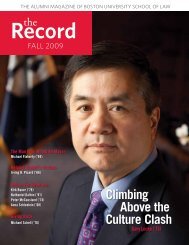the nature of representation: the cherokee right ... - Boston University
the nature of representation: the cherokee right ... - Boston University
the nature of representation: the cherokee right ... - Boston University
Create successful ePaper yourself
Turn your PDF publications into a flip-book with our unique Google optimized e-Paper software.
112 PUBLIC INTEREST LAW JOURNAL [Vol. 15<br />
have to be presented to <strong>the</strong> Cherokee people before a treaty could be agreed upon. 113<br />
While Ross urged <strong>the</strong> Cherokees to democratically accept or reject <strong>the</strong> Senate’s<br />
<strong>of</strong>fer, <strong>the</strong> U.S. commissioners argued that democratic negotiations were <strong>the</strong> only<br />
possible route to ensure meaningful treaty approval. 114<br />
This democraticidea, however, does not correspond with <strong>the</strong> actual attendance at<br />
<strong>the</strong> negotiations. Schermerhorn and Governor Carroll wrote to <strong>the</strong> “chiefs, head<br />
men, and people <strong>of</strong> <strong>the</strong> Cherokee nation” that <strong>the</strong>y “must not listen, or believe any<br />
man that is sent to you to tell you not to come to <strong>the</strong> council at New Echota.” 115<br />
Francis Paul Prucha highlights how <strong>the</strong> Treaty itself reveals <strong>the</strong> non-democratic<br />
<strong>nature</strong> <strong>of</strong> <strong>the</strong> negotiations:<br />
In an unusual preamble, <strong>the</strong> United States sought to justify its reliance on<br />
only a portion <strong>of</strong> <strong>the</strong> tribe by reciting <strong>the</strong> history <strong>of</strong> negotiations with <strong>the</strong><br />
Cherokees and by noting <strong>the</strong> earlier warning that those who did not attend <strong>the</strong><br />
council would be considered to have given <strong>the</strong>ir assent to whatever might be<br />
done at <strong>the</strong> council. On this shaky foundation <strong>the</strong> United States procured a<br />
removal treaty with <strong>the</strong> Cherokees. 116<br />
The number <strong>of</strong> Cherokees who actually came to New Echota in December was<br />
only between 200 and 700, with Schermerhorn standing by <strong>the</strong> larger figures while<br />
Ross and even members <strong>of</strong> <strong>the</strong> U.S. negotiating party cited estimates at <strong>the</strong> low<br />
end <strong>of</strong> this range. 117 A dispute would later erupt between Schermerhorn and a lower<br />
ranking U.S. agent who felt <strong>the</strong> Treaty was illegitimate because it failed even along<br />
<strong>the</strong> democratic lines pr<strong>of</strong>essed to govern <strong>the</strong> negotiations: “[T]hat paper, containing<br />
<strong>the</strong> articles entered into at New Echota, in December last, called a treaty, is no<br />
113<br />
Memorial from <strong>the</strong> Cherokee Delegation headed by John Ross to <strong>the</strong> U.S. Senate<br />
and House <strong>of</strong> Representatives (Jun. 21, 1836), in 1THE PAPERS OF CHIEF JOHN ROSS,<br />
supra note 14, at 450.<br />
114<br />
Presidential Message on <strong>the</strong> Treaty with <strong>the</strong> Cherokee Indians, S. Exec. Doc. No.<br />
7, 23rd Cong., 1st Sess., 1-2 at 2.<br />
115<br />
Notice from J.F. Schermerhorn and Gov. William Carroll, U.S. Commissioners, To<br />
<strong>the</strong> Chiefs, Head Men, and People <strong>of</strong> <strong>the</strong> Cherokee Nation <strong>of</strong> Indians (Nov. 3, 1835), in<br />
TREATY WITH THE CHEROKEE INDIANS, 24th Cong., 1st Sess., 19. Most Cherokees decided<br />
not to go to New Echota: “Ross and his followers disregardedthis invitation [to <strong>the</strong><br />
New Echota negotiations] . . . . Schermerhorn’smeeting, <strong>the</strong>y knew, was bound to be<br />
ano<strong>the</strong>r such fiasco as <strong>the</strong> one Ridge had called in <strong>the</strong> summer. Their departure at just<br />
this juncture was none <strong>the</strong> less a crucial strategic error.” STARKEY, supra note 80, at<br />
265.<br />
116<br />
PRUCHA, supra note 17, at 179.<br />
117<br />
Schermerhorn requested letters from different participants and observers at New<br />
Echota in response to a report in <strong>the</strong> A<strong>the</strong>ns Journal on <strong>the</strong> numbers <strong>of</strong> Cherokees in<br />
attendance. These letters were collectively submitted to Congress alongside <strong>the</strong> Treaty<br />
for ratification. Journal <strong>of</strong> <strong>the</strong> proceedings <strong>of</strong> <strong>the</strong> Council held at New Echota, Georgia,<br />
Dec. 21-30, 1835, with <strong>the</strong> Cherokee people by John F. Schermerhorn, Commissioner on<br />
<strong>the</strong> part <strong>of</strong> <strong>the</strong> United States to treat with <strong>the</strong> Cherokees east, in TREATY WITH THE<br />
CHEROKEE INDIANS, 24th Cong., 1st Sess., 20-27.









